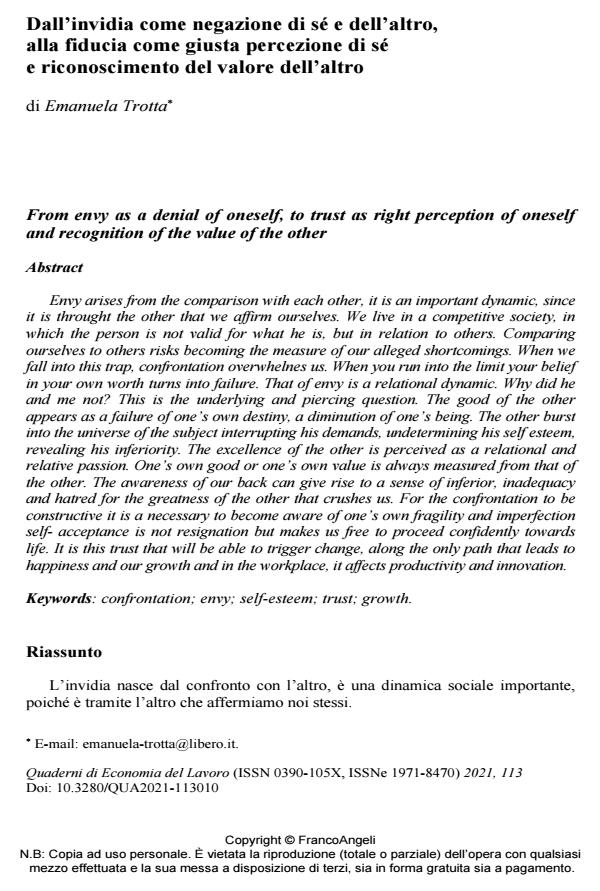From envy as a denial of oneself, to trust as right perception of oneself and recognition of the value of the other
Journal title QUADERNI DI ECONOMIA DEL LAVORO
Author/s Emanuela Trotta
Publishing Year 2022 Issue 2021/113
Language Italian Pages 11 P. 233-243 File size 238 KB
DOI 10.3280/QUA2021-113011
DOI is like a bar code for intellectual property: to have more infomation
click here
Below, you can see the article first page
If you want to buy this article in PDF format, you can do it, following the instructions to buy download credits

FrancoAngeli is member of Publishers International Linking Association, Inc (PILA), a not-for-profit association which run the CrossRef service enabling links to and from online scholarly content.
Envy arises from the comparison with each other, it is an important dynamic, since it is throught the other that we affirm ourselves. We live in a competitive society, in which the person is not valid for what he is, but in relation to others. Comparing ourselves to others risks becoming the measure of our alleged shortcomings. When we fall into this trap, confrontation overwhelnes us. When you run into the limit your belief in your own worth turns into failure. That of envy is a relational dynamic. Why did he and me not? This is the underlying and piercing question. The good of the other appears as a failure of one’s own destiny, a diminution of one’s being. The other burst into the universe of the subject interrupting his demands, undetermining his self esteem, revealing his inferiority. The excellence of the other is perceived as a relational and relative passion. One’s own good or one’s own value is always measured from that of the other. The awareness of our back can give rise to a sense of inferior, inadequacy and hatred for the greatness of the other that crushes us. For the confrontation to be constructive it is a necessary to become aware of one’s own fragility and imperfection self- acceptance is not resignation but makes us free to proceed confidently towards life. It is this trust that will be able to trigger change, along the only path that leads to happiness and our growth and in the workplace, it affects productivity and innovation.
Keywords: confrontation; envy; self-esteem; trust; growth.
Emanuela Trotta, Dall’invidia come negazione di sé e dell’altro, alla fiducia come giusta percezione di sé e riconoscimento del valore dell’altro in "QUADERNI DI ECONOMIA DEL LAVORO" 113/2021, pp 233-243, DOI: 10.3280/QUA2021-113011